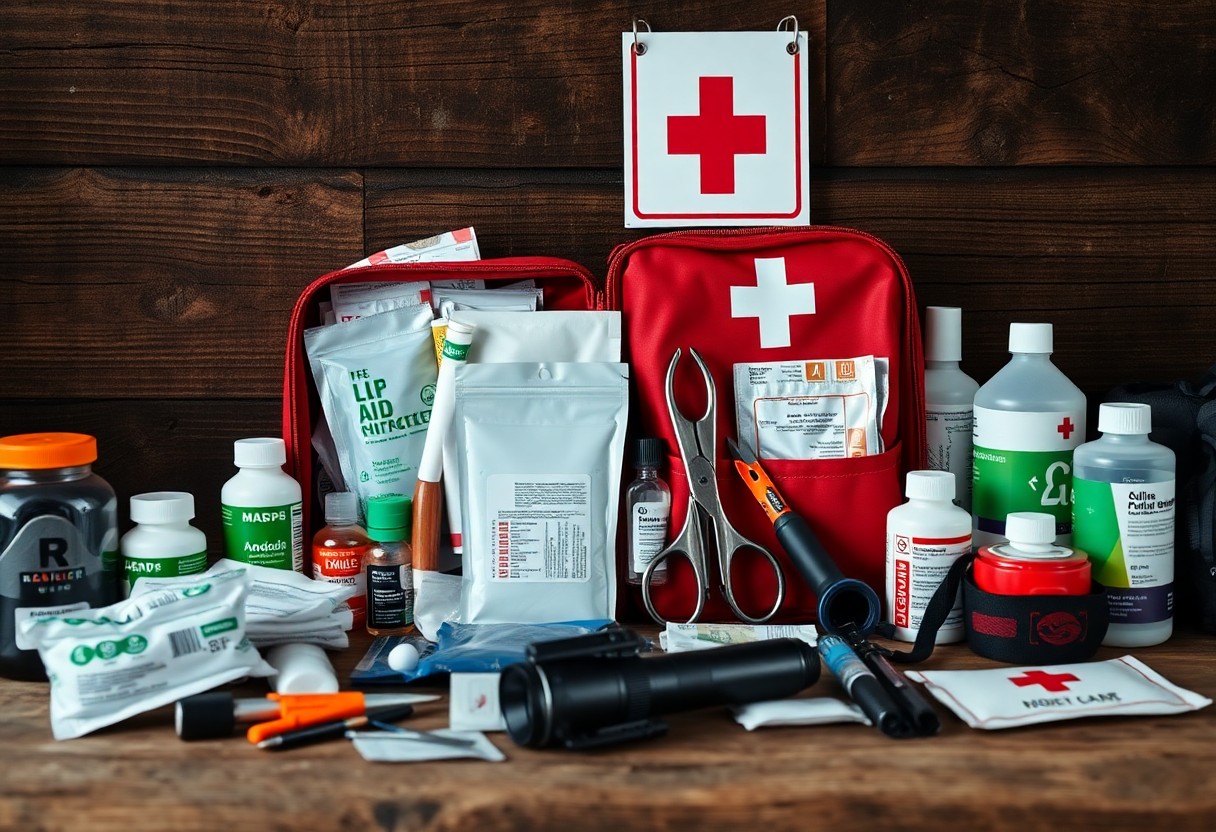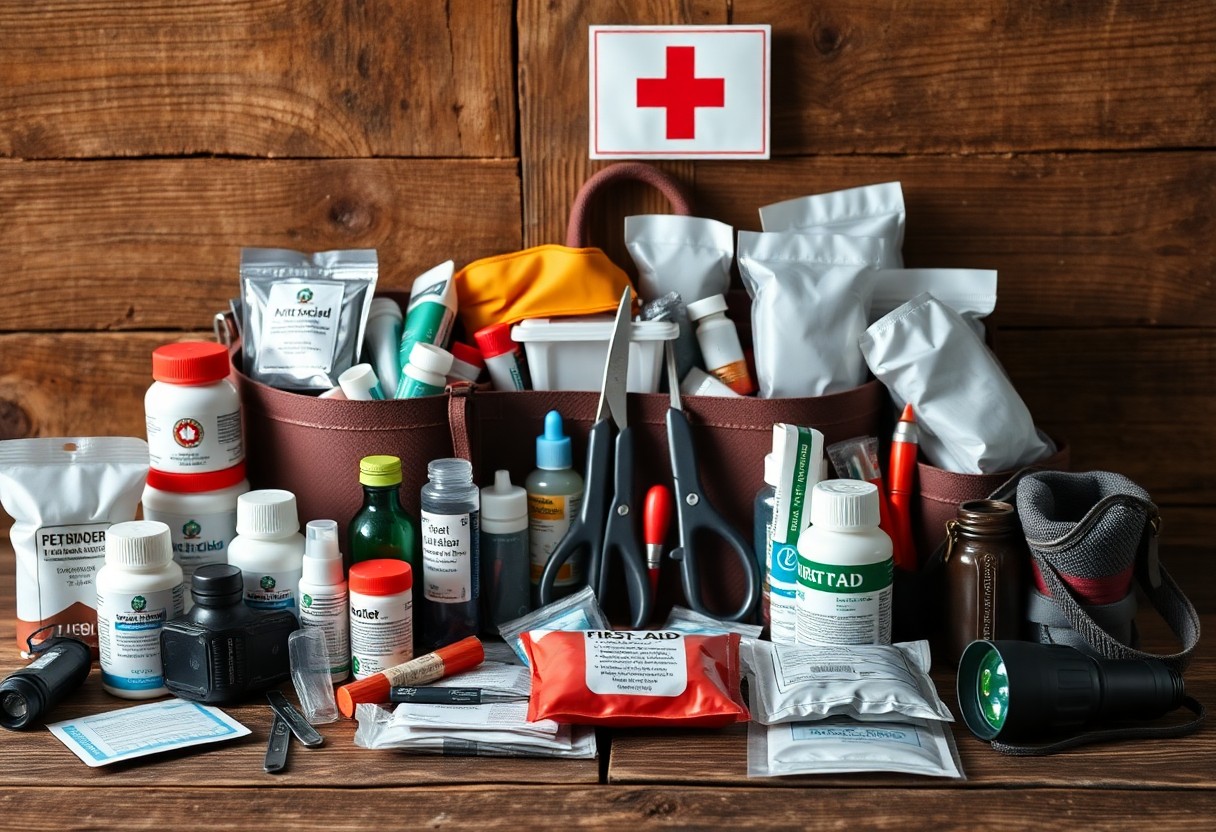Most off-grid enthusiasts understand the importance of preparation, especially when it comes to health and safety. Creating a resilient first aid and health kit is not just about packing a few band-aids; it’s about ensuring you have the right supplies to handle emergencies and maintain your well-being in remote settings. In this guide, you will discover the imperative items needed, strategies for organization, and tips on how to tailor your kit to your specific needs, ultimately empowering you to face unforeseen challenges with confidence.
Key Takeaways:
- Comprehensive Supplies: Ensure your first aid kit includes a variety of medical supplies, such as bandages, antiseptics, and medications for common ailments.
- Personalized Items: Customize your kit with personal health items tailored to individual needs, such as prescriptions, allergy medications, and specific medical devices.
- Regular Maintenance: Conduct routine checks to replenish expired items, ensuring the kit remains effective and ready for emergencies.
Understanding Off-Grid Health Needs
Before launching on an off-grid adventure, it’s important to recognize that this lifestyle requires a different approach to health care. You must be equipped to handle unique situations where medical facilities are either far away or non-existent. Understanding your health needs will empower you to create a tailored first aid and health kit that can effectively address potential emergencies and minor ailments.
Assessing Risks in Remote Settings
At any off-grid location, you should carefully assess the specific risks present in your environment. Factors like climate, terrain, and wildlife pose various challenges to your health. Identifying these risks allows you to prepare adequately and establish preventive measures for your unique situation.
Common Health Issues in Off-Grid Environments
Around off-grid environments, various health issues may arise due to limited resources and exposure to nature. You might encounter common ailments such as allergic reactions, skin infections, and dehydration. Understanding these risks helps you prepare better and ensures that you have the necessary supplies and knowledge to deal with these issues effectively.
Issues like dehydration can escalate quickly in remote settings, especially during strenuous activities or hot weather. You must have adequate drinking water and methods to purify it. Additionally, minor cuts and scrapes are common and can become infected if not treated promptly, so ensure you carry a comprehensive first aid kit. Exposure to wildlife may lead to animal bites or stings; thus, having knowledge about first aid responses and carrying appropriate medications for allergic reactions is important. Being proactive about these potential health issues can significantly enhance your off-grid experience.
Essential Components of a First Aid Kit
Some components are vital for an effective first aid kit that can meet the needs of both daily challenges and unexpected emergencies. Your kit should include supplies for treating minor injuries like cuts and scrapes, as well as tools to manage more serious health issues. Being prepared with the right importants can make all the difference in a survival situation.
Basic Supplies for Immediate Care
Across your first aid kit, you should have basic supplies such as adhesive bandages, sterile gauze pads, medical tape, antiseptic wipes, and scissors. These items provide the foundation for addressing most immediate care needs. Having them organized and easily accessible ensures you can act quickly when the situation demands it.
Specialized Items for Off-Grid Situations
Care should be taken to include specialized items that can handle unique challenges you may face while off the grid. These might include splints for fractures, as well as snake bite kits and water purification tablets. Being proactive about these additions can significantly elevate your preparedness for unexpected events.
Plus, you should prioritize items like antivenom kits, emergency thermal blankets, and first-aid instructional manuals to enhance your safety and knowledge in off-grid situations. Consider incorporating herbal remedies or important oils that can aid in wound healing and pain relief. Each item you choose can play a significant role in managing life-threatening situations, helping you to stay healthy and resilient in the wild.

Personal Health Considerations
Your health is paramount when preparing an off-grid first aid kit. It’s necessary to consider your unique personal health needs, including any chronic conditions, allergies, and lifestyle choices that may impact your well-being. Tailoring your kit to suit these personal considerations will enhance your preparedness and ensure you can effectively address health issues as they arise.
Chronic Conditions and Necessary Medications
Conditions that require ongoing management, such as diabetes, asthma, or heart disease, should dictate the composition of your first aid kit. Stock up on necessary medications, supplies, and monitoring tools to ensure your health remains stable while in an off-grid setting. Always factor in storage for medications that may require refrigeration or specific conditions for efficacy.
First Aid Training and Skills
Along with having the right supplies, possessing skills is vital when it comes to health and safety in off-grid scenarios. Knowing how to perform basic first aid can be the difference between effective treatment and worsening a situation, especially in emergencies where professional help may be far away.
But having first aid training means you’re equipped to handle injuries, assess life-threatening situations, and execute critical interventions like CPR. Strong skills in first aid empower you to manage both minor and major emergencies efficiently. Actively practicing these skills will boost your confidence and may even encourage your companions to learn as well. A well-rounded understanding of first aid not only ensures your safety but also enhances the overall resilience of your group in challenging situations.
Building a Resilient Health Kit
Keep your health kit comprehensive and adaptable to various situations. Include imperatives such as bandages, antiseptic wipes, prescription medications, and a thermometer. Think about your specific needs and consider adding items like allergy medication or first aid manuals to tailor it to your lifestyle. A well-stocked kit ensures you are prepared for emergencies when off the grid.
Storage and Organization Tips
The organization of your health kit can enhance its effectiveness. Use a durable, waterproof container and separate items using labeled pouches. Consider the following tips:
- Label everything for quick identification.
- Group supplies by type (wound care, medications, tools).
- Check expiration dates regularly.
The more organized your kit is, the easier it will be to find what you need in an emergency.
Regular Maintenance and Replenishing Supplies
With regular maintenance, you ensure your health kit remains effective and complete. Conduct routine checks to assess the condition of your items and replace any that are used or expired. Keeping a checklist can help you manage what needs to be replenished, ensuring you never run out of important supplies.
Organization is pivotal in maintaining an effective health kit. Set a calendar reminder to review your kit every six months and focus on replenishing used items and replacing expired medications. By staying proactive, you can prevent situations where you might lack necessary supplies during an emergency, making your off-grid experience safer and more secure.
Natural Remedies and Alternative Medicine
Once again, as you prepare for an off-grid lifestyle, considering natural remedies and alternative medicine can significantly enhance your first aid and health kit. These methods often provide effective solutions for common ailments, minimizing your reliance on pharmaceuticals. Incorporating these remedies into your healthcare strategy not only helps you maintain wellness but also aligns with the principles of self-sufficiency and resilience.
Herbal Treatments for Common Ailments
An effective way to address everyday health issues is through herbal treatments. With plants like ginger for nausea, echinacea for immune support, and peppermint for digestive discomfort, you can create a powerful arsenal against common ailments. Make sure you educate yourself on proper dosages and preparation methods to ensure safety and efficacy.
Integrating Natural Remedies with Traditional Medicine
An important aspect of holistic health is the synergy between natural remedies and traditional medicine. By integrating both approaches, you expand your toolkit for maintaining wellness. You can use herbs to complement prescribed medications or support your body during recovery without substituting necessary treatments.
Treatments that blend natural remedies with traditional medicine can be particularly effective if done correctly. It’s vital to consult a healthcare professional when combining these two methods, as some herbal supplements may interact with prescribed medications. Additionally, keeping an open line of communication with your healthcare provider ensures that you utilize safe and beneficial practices in your quest for optimal health. Striking this balance enables you to harness the strengths of both worlds while remaining mindful of potential risks.
Emergency Preparedness and Response
Despite the unpredictability of emergencies, being prepared can make a significant difference in managing crisis situations. Your emergency preparedness plan should encompass not only immediate medical needs but also logistical aspects like communication and evacuation routes. By understanding potential risks in your area and organizing relevant supplies, you can bolster your resilience and enhance your family’s safety in challenging circumstances.
Creating an Emergency Action Plan
Preparedness begins with an effective emergency action plan. You should outline clear procedures for various scenarios, designating specific roles and responsibilities for each family member. Consider assembling a kit that includes important supplies and ensuring everyone knows its location. Regularly review and practice this plan to boost confidence and coordination during unexpected events.
Communicating in Crisis Situations
Between the chaos of an emergency, clear communication becomes vital to ensure safety and coordinate responses. You should establish a communication strategy that includes designated contacts and alternative methods for reaching them, such as text messaging or social media. This way, you can keep your family informed and make informed decisions amidst potential disruptions.
Response efforts in crisis situations can be severely hindered if communication fails. Establishing a reliable system allows you to stay connected with your family even when traditional methods break down, like power outages or network failures. Prioritize having backup communication devices and designated meeting spots to reinforce the positive aspect of being prepared, as it fosters confidence and security during uncertain times. Make sure to routinely check in on friends and neighbors, as collaboration can amplify your collective response to emergencies.
Summing up
As a reminder, creating a comprehensive off-grid first aid and health kit is crucial for your safety and well-being. By equipping yourself with the right supplies and knowledge, you ensure that you are prepared to handle medical emergencies effectively. Regularly review and update your kit to adapt to your needs and any changes in your environment. Prioritizing health and safety will enhance your resilience, allowing you to navigate any challenges with confidence.
FAQ
Q: What items are important for an off-grid first aid kit?
A: An off-grid first aid kit should include basic supplies such as adhesive bandages, sterile gauze pads, medical tape, antiseptic wipes, and antibiotic ointment. Additionally, consider adding pain relievers, a thermometer, scissors, tweezers, and a multi-tool. It can also be beneficial to include specialized items like splints, snake bite kits, and any necessary prescription medications.
Q: How do I store and maintain my off-grid health kit?
A: Store your health kit in a waterproof and durable container to protect the supplies from moisture and damage. Keep the kit in a cool, dry place to prevent degradation of materials over time. Regularly check your supplies, and replace any expired items. It’s advisable to conduct a full inventory of your kit every six months to ensure everything is in good condition.
Q: Are there any natural remedies I should include in my health kit?
A: Yes, incorporating natural remedies can be beneficial. Items such as honey (for antiseptic properties), tea tree oil (for its antimicrobial effects), and arnica cream (for bruising and swelling) are popular choices. Additionally, dried herbs like chamomile and peppermint can serve as calming teas for digestive issues. Ensure you research the proper uses and dosages of each natural remedy.
Q: How can I equip myself with medical knowledge for off-grid emergencies?
A: Educating yourself is key to effectively using your health kit. Consider taking courses in first aid and CPR to gain foundational knowledge. Books on wilderness medicine can offer valuable insights into common injuries and treatments in off-grid scenarios. Online resources like videos and forums may also provide useful tips and community support.
Q: What should I do in case of a medical emergency while off-grid?
A: If faced with a medical emergency, assess the situation to determine the best course of action. Use the supplies from your health kit to address immediate needs, such as stabilizing an injury or managing pain. If the situation allows, call for help or set up a signal for rescue. Having a communication device like a two-way radio or satellite phone can be beneficial for contacting emergency services.


